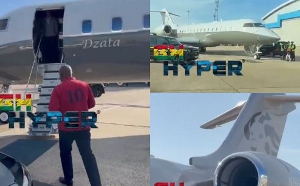The Africa Growth and Opportunity Act signed into law in the United States on May 18, 2000 has evolved into a side door route for the US to access oil and gas supplies from Sub-Saharan Africa. Origionally created to improve US trade with selected African countries, the AGOA act has gradually moved from its broad imports base to a concentrated import program of petroleum products and oil and gas related equipment from Nigeria (47.2%), Angola (19.8%) South Africa (12.7%) Republic of Congo (5.2%) and Chad (3.2%).
Ghana’s exports to the US under AGOA in 2006 made up 2.4% of all total exports under the Act. South Africa, Nigeria and Angola maintained a lead in trade exports to the US, accounting for 68% of exports. Sub-Sahara Africa’s exports of oil and gas related supplies in 2006, now nearly equals US imports from the Middle East. US total trade with Africa has increased in 2006 by 17%, the trade gap in favor of the African countries, and is now up to $47.1 billion, a 20% increase in the year. Petroleum products now account for 93% of overall AGOA products. Imports of transportation equipment improved with South Africa, minerals and metals – platinum, diamonds, iron and steel also improved with Angola and Nigeria. Textile apparel imports (where Ghana hoped to increase its share) fell 11% to $1.3 billion.Ironically, the 6th AGOA forum scheduled for July 2006 will be held in Accra on the 18th and 19th. Don’t go to the website (www.agoa.gov.gh) specifically designed for the forum for any information. The “read more” button on the site, loops back to the home page, so be satisfied with the theme for the year, “As trade grows, Africa prospers:- optimising the benefits under AGOA”. And there is your first wasted effort. A website that tells you nothing beyond the headings and themes for discussion is about as useful as a duck without webbed feet.
In July of 2005, the Office of the United States Trade Representative prepared an African Growth and Opportunity Act Competitiveness Report for its trade partners. Ghana’s main export profile included Cocoa beans, gold and wood products. Others were aluminum, pineapples, fish products, petroleum products, cocoa paste, butter, and manganese. AGOA export capacity in 2004 was assessed at $74 million, 53% of Ghana’s total exports to the United States. You can access this report on the global AGOA site, www.agoa.gov. Look for the “2005 AGOA competitiveness report”.
But here is the crux of this piece. Major challenges to export growth in Ghana were identified as follows. Business Environment – above average in the region, with notable exceptions to the time to register property. This translates into problems with land title etc. registration. Transportation and Customs – poor road quality impedes the timely delivery of goods. Others impediments include congestion at the ports and airport. Capital – High cost of local financing and slow delivery of banking services. Labor –short supply of skilled workers. Agriculture – lack of capacity to meet sanitary and phytosanitary standards of the EU and US markets. Fisheries – Unstable and unreliable supply of electricity and water. Wood and Wood products – in danger of depleting forest resources. Tourism – the sector is under-capitalised and under-developed. Other factors? - lack of market research, poor marketing and high electricity prices, with an over reliance on hydro electricity. Under AGOA, Ghana’s exports to the US increased from $309.6$ (2004), $337.4 (2005) and fell dramatically in 2006 to $289.7.
Three years after the US competitiveness report, the identified problems remain the same or have become more exacerbated. Any keen follower of events in Ghana is aware of the recent energy crisis in the country, the issues of water are ongoing and the business environment is still problematic at best. Even the President’s tag on special initiative projects is not a guarantee for success. Tried buying a piece of land in Ghana recently?
For as long as I have been in financial consulting, these issues have been the bane of all our problems. I do not know how we managed to attract $547 million, because as far as I can remember, the stumbling blocks have been in these areas. True, when you compare Ghana to the rest of Sub-Sahara Africa, we are streaks ahead in many ways. But our comparison must now be to South Africa, Botswana, Angola and the countries that make up the SADC trade region. Trade barriers in ECOWAS, language barriers and access to capital in the region are no longer adequate benchmarks for our economic progress. Customs officials in Nigeria, Liberia and Sierra Leone, still ask for visas from other ECOWAS nationals despite the 90 day access in the treaty. Over-elaborate customs checks, bribe solicitation and unnecessary disruptions in cross-border trade are still unchecked and supported by institutional props. Now we are faced with a growing drug menace, becoming a conduit for Venezuelan and Columbian traffic.
We cannot deal with the challenges of trade if these issues are not addressed with more determination than political gainsaying. If we are seriously considering maturing our trade policies, capital and skilled labor to the level of middle-income status, we should challenge ourselves to definite deadlines and key deliverables. Therein lies our wasted effort. The US is importing oil through the AGOA Act of which we have not any. What we have is agricultural produce and cotton apparel, if that. The only market here for our food and clothing is the growing Ghanaian economic base in the Diaspora, and even that we do not produce enough to feed ourselves at home, how much more create a viable enough export market to sustain a trading enterprise. One Government must get on top of these issues with a resolve to remove the bottlenecks before the next. We should not keep passing over the problems to successive Governments. The political bickering just become wasted effort.
Sydney Casely-Hayford is publisher of The New Ghanaian newspaper and a financial consultant. He is a member of the UK Accountancy institute and is involved in several socio-economic issues on Africa. You can access this story and many others through our website, www.thenewghanaian.com.

Views expressed by the author(s) do not necessarily reflect those of GhanaHomePage.

Views expressed by the author(s) do not necessarily reflect those of GhanaHomePage.














